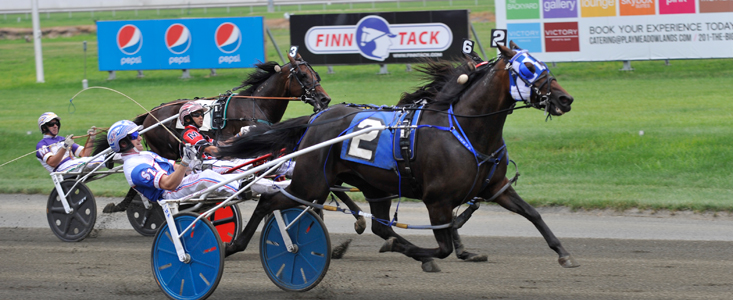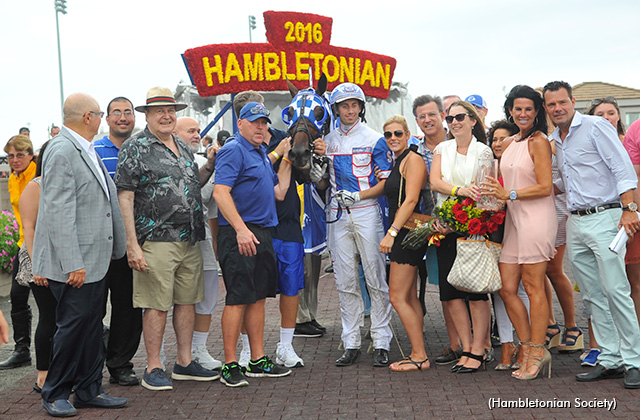When a Canadian-based, Quebec-bred went south on Hambletonian Day to face some of the best older pacing horses ever to race, few thought he’d come out a winner.
But apparently nobody told Shamballa about his limitations. By Paul Delean

For a standardbred horseman, a Hambletonian win is as good as it gets. To also win the U.S. Pacing Championship the same afternoon, in one of the fastest race miles ever, behind an animal trained and co-owned by your dad, just made the day exponentially better for driver Scott Zeron.
“I’m going to try and enjoy this as long as I can,” said Zeron, 27, a few days later. “It wasn’t just the two wins, it was outfinishing horses people thought could not be beat, and winning for my dad, after all he contributed to my development as a driver. I’d give the day a 10 (out of 10). Make that a 9. I’d like to hope there might be something even bigger down the road.”
While Marion Marauder’s nose victory over Southwind Frank in the Hambletonian was a mild upset, Shamballa’s 1:47.1 triumph in the $225,500 Pacing Championship was a bit of a stunner.
He was facing North America’s “big three” older pacers – Wiggle It Jiggleit, Always B Miki and Freaky Feet Pete – millionaire winners of multiple stakes.
Although stakes-placed, including a runner-up finish to State Treasurer in last year’s Canadian Pacing Derby at Mohawk and to Always B Miki in this year’s William Haughton Memorial at The Meadowlands, Shamballa had never won a stakes race prior to the Pacing Championship.
Most of the late-blooming 6-year-old’s earnings had been ground out in the preferred class at Mohawk and Woodbine, where he’s been a stalwart in the top pacing classes for two years, known for his spectacular finishes.
“That trip was a gift from God,” said breeder and co-owner Paul Deslauriers, 53, who watched the race from his Florida home.
A native of Quebec City, Deslauriers and his father Pierre used to own one of Quebec’s most ambitious and free-spending racing and breeding operations, Bolero Stable.
“We want world champions,” Deslauriers said in an interview two decades ago with the Montreal Gazette, explaining why the Quebec City outfit was suddenly shelling out up to $75,000 (U.S.) for yearlings and $40,000 (U.S.) broodmares. “If that’s what you want, you have to pay the price.”
Deslauriers’ first big horse, however, was a steal. Bolero Takara, a Life Sign filly bred by Ontario’s Cuddy Stables, cost just $10,500 (U.S.) as a weanling.
She went undefeated in 11 starts in Montreal and Kentucky as a two-year-old in 1998, setting a world record with a mile of 1:52.2 at The Red Mile, and was an O’Brien Award finalist that year.
At three, battling foot problems, she raced only seven times, winning twice, including an elimination of the Breeders’ Crown at Mohawk. In the final, she finished second to Odies Fame, a 2016 inductee to the Canadian Horse Racing Hall of Fame. It was Bolero Takara’s last start. “She’d earned more than $500,000, done everything we’d asked her to. With her spirit, I had a feeling she’d be an outstanding broodmare so that’s what we did,” Deslauriers said.
The slide and eventual collapse of the Quebec racing industry, in 2009, put the Bolero Stable on ice. Deslauriers figures he lost $1 million by the time they sold the farm near Quebec City and dispersed most of the stock, which at one time was up to 40 horses.
He kept six horses including Bolero Takara, who came with him to Florida when he exited the family kitchen-cabinet and countertop business in Quebec City.
She proved as productive a broodmare as she was a racehorse, with nine starters in her first 10 foals and average earnings per starter of almost $300,000. Now 20, she is owned by Cornerstone Stock Farm of Indiana, which purchased her privately from Deslauriers for about $25,000 (U.S.) while he was going through a post-recession financial squeeze.
Shamballa, from the first crop of champion Somebeachsomewhere, has been her biggest money-winner to date with more than $800,000 on his card, but her first two foals, Bolero Charles and Bolero Taishi have topped $600,000 and $500,000 respectively.
Three of her first four foals took fast marks at age two, including her fourth foal, Bolero Tallia, who won the Lucien Bombardier Stakes in Montreal in 1:54.2, but Deslauriers said the pattern with subsequent offspring was that they got better as they got older. By the time Shamballa came along, he had decided to heed the counsel of his former trainer Serge Bernard and not race the babies.
“I’m convinced that’s one of the reasons for Shamballa’s success,” he said. “Racing them at two is a waste.”
Shamballa (the name of a tile store that Deslauriers owned at one time in Florida) was placed initially in the care of trainer Fred Grant.
“Fred does all my babies,” Deslauriers said. “He told me he was tough, and that if he was bigger, he’d be a champion.”
Gelded at two because of his unruliness, Shamballa started his career at three at Pocono Downs, where he won 5 of 11 starts and took a mark of 1:52f.
When he went 0-for-4 to start his four-year-old campaign, Deslauriers called Zeron – to whom he’d sent a couple of ordinary horses years before – and asked if he’d take Shamballa.
“I’ve been lucky in Ontario,” Deslauriers said. “And I didn’t want to race against two from the Ron Burke stable every week.”
Right from the start, Zeron liked what he saw, and after schooling the horse, asked Deslauriers if he’d be interested in selling a piece.
“I told my assistant that this is a God-given machine we have here,” Rick Zeron said. “If I can control his speed and keep him sound, I knew he’d be a great asset to the Zeron operation.”
Deslauriers, who has adopted the Bolero name for his wholesale ceramic and tile business in Pompano Beach and Tao Racing for his stable, initially parted with 15 per cent.
Zeron won seven races in three months with the stable’s new addition, including a career-best 1:49 score at Mohawk.
At five, Shamballa became a standout in the Preferred ranks, winning eight of 16 starts and $358,315 in 2015, and lowering his mark to 1:48s.
“We raced Shammy easy, like the Europeans do, so he would come back. I thought his best years would be at six and seven,” Rick Zeron said.
Deslauriers wasn’t as confident, especially with Always B Miki back and Wiggle It Jiggleit and Freaky Feet Pete due to join the ranks of older pacers. He parted with another 60 per cent of the horse, reducing his stake to 25 per cent, and Zeron brought in U.S. owners Howard Taylor and Cool Cat Racing.
“I knew we’d have to face that bunch this year and I wasn’t looking forward to it,” Deslauriers said. “Maybe it was a mistake, but I’m not rich. I made good money with that horse. He erased years of losses. And I still have 25 per cent.”
After a pair of wins at Mohawk to start the season, Shamballa finished second to Always B Miki in the $100,000 Mohawk Gold Cup on North America Cup night, then shipped to Pocono for the eliminations and final of the $500,000 Ben Franklin Pace, where he was driven for the first time by Scott Zeron.
After finishing third to Wiggle It Jiggleit and State Treasurer in the elimination, the horse had a brutal trip in the Franklin final and finished out of the money, more than 10 lengths behind winner, Always B Miki.
“I told my dad to throw that one out,” Scott said. “He was really hot in the final, we had terrible cover, nothing worked out. I told him he can go with these horses, he’ll redeem himself. We just need a better trip.”
Next time out, in the Haughton Memorial, he finished within a length of Always B Miki at a mile and an eighth despite being parked most of the mile.
“It almost felt like a win. Redemption,” Scott said.
That set the stage for the U.S. Pacing Championship shocker, where he rallied from fifth, and rocketed past the big three to score by a length in a career best 1:47.1.

Noticeably absent from the winner’s circle festivities, however, was Rick Zeron, who not only made Shamballa a top-level horse, but was pivotal in the development of the driver who made him a stakes winner.
“I had a three-year-old trotting filly racing (in Ontario) and wanted to see if she was good enough,” Rick said. “Scott said he wanted me down there but that was his day. We got Shamballa ready for him, he did the rest. He’s a great driver. He didn’t need me sitting on his coat tails.”
Scott said he didn’t insist. “I wouldn’t tell him to give up a race card for that. Drivers miss a lot of things. We’ve always had a good relationship. He never pushed me to do anything I didn’t want to do. He didn’t push me to be a driver. It’s a tough job. I was so bad when I started, and he was so patient, never got upset. That was crucial.”
Rick, who has driven Shamballa almost exclusively for the past two years, says he’s “Scott’s horse for the rest of the year.”
Scott begs to differ. “The Canadian Pacing Derby conflicts with the Yonkers Trot (where Marion Marauder is scheduled to race), so I told him he’s got to go back to being his horse.”
Deslauriers doesn’t care which of them drives. Both know the horse’s quirks and have done excellent work, he said.
“Rick Zeron is an incredible horseman with a good team. If I get another one like this, I’m sending it to him,” said Deslauriers, who currently owns four horses.
Zeron said that, knowing how it played out, he would have gone to the Hambletonian. He will go in the future, he said, though not necessarily to be in the photo after another major victory by his son.
“The Hambletonian is still a dream of mine too,” he said. “If I have a trotter good enough to race in it, I may have to tell Scott to sit this one out.”


